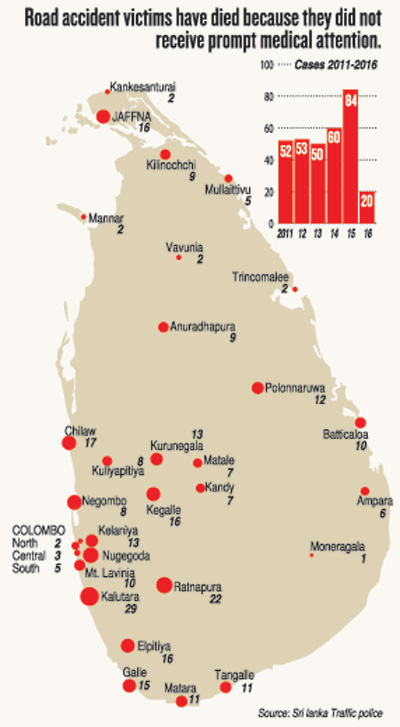News
Samaritans to be rescued from accident red tape
In a move to encourage people to take action to save lives of accident victims, the government will introduce guidelines to protect “good Samaritans” from the hassle of being involved in bureaucracy related to the accident.
Good Samaritans will be shielded from unnecessary hospital paperwork and from interrogation by police who see them as useful eyewitnesses to accidents.
The reform follows a Fundamental Rights petition filed by the Foundation for Civilian Bravery (FCB), inspired by action in India.
Stakeholders cited as respondents in the petition, filed by FCB founder Kasun Chandraratne in 2017, include the Department of Motor Traffic, Ministry of Highways, the Inspector-General of Police, Ministry of Law and Order, Ministry of Transport and Aviation, Ministry of Health, Ministry of Justice and the Attorney-General.
All stakeholders agree that good Samaritan protection law should be drafted and have reached consensus on guidelines now incorporated in a draft drawn up by the Ministry of Transport. The final draft will be given to the Supreme Court in May and the court’s adopted guidelines will hold as law until legislation is passed by parliament.
In 2015, the Indian Supreme Court, pending central government legislation, issued directives to protect good Samaritans who perform acts such as taking accident victims to hospital speedily from being treated as a suspect or hassled in accident investigations.
Inspired by the Indian move, the FCB filed its petition two years later.
Police say between 2011 to 2016, some 320 road accident victims died because they did not receive prompt medical attention.
The first hour of the accident is the “golden hour” for a victim to survive, Batticoloa Teaching Hospital consultant surgeon Dr. Peethambaram Jeepara, said, citing research he has carried out on road traffic accidents.
He accepts many people do not come forward to help due to the problems involved when helping an injured person because they have to give their personal details and sign forms for any medical emergency – and are most of the time regarded by police as the prime suspect. In addition, there is the added hassle of appearing in courts for months, if not years, on end until the case is closed.
Among suggestions in the draft bill to be presented to the Supreme Court in May, a good Samaritan will not be required to:
- furnish any personal information, including name, telephone number and address at the hospital unless the act is voluntary
- sign for the preparation of a medical/legal form
- become involved in the procedure related to the admission of an injured person at a hospital or pay for that person’s treatment
- be examined by police unless admitting to be an eyewitness to the accident or having incurred reasonable suspicion of having been a witness.
Any police examination of a good Samaritan should be carried out at a time and place convenient to the Samaritan by non-uniformed police officers unless the citizen volunteers to visit the police station. Statements are to be recorded in full in one visit.
A good Samaritan telephoning police or the emergency services about a person lying injured on the road will not have to reveal name or other personal details and will not be liable for an act done, or omission made, in good faith unless being grossly negligent or reckless while providing emergency care.
This indemnity will not apply to intentional death or attempting to cause death or injury.
All stakeholding departments will be informed and public officers who violate the guidelines will face disciplinary action.
Action will be taken to reward or compensate a good Samaritan in order to encourage other citizens to come forward and help road accident victims.
In addition, lack of response by a medical professional in an emergency involving a road accident victim will be judged as professional misconduct, and disciplinary action will be taken against such medical professionals.
A charter in Sinhala, Tamil and English will be displayed in a prominent place indicating that a good Samaritan will not be detained or asked to deposit money for treatment of a victim of a road accident.
A letter containing the guidelines is to be issued by the Ministry of Health to all hospitals and institutes with a copy of the gazette notification.
The guidelines will also be publicised through the media to inform the general public.

